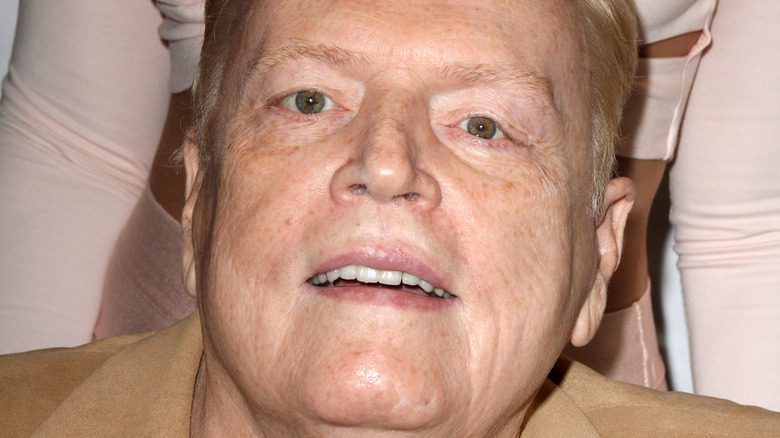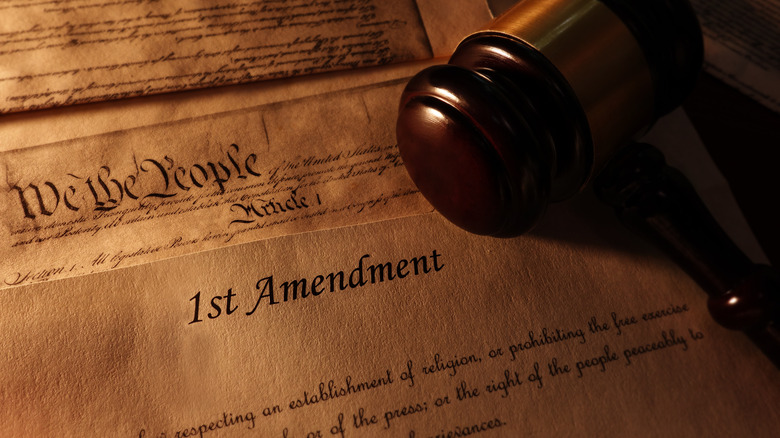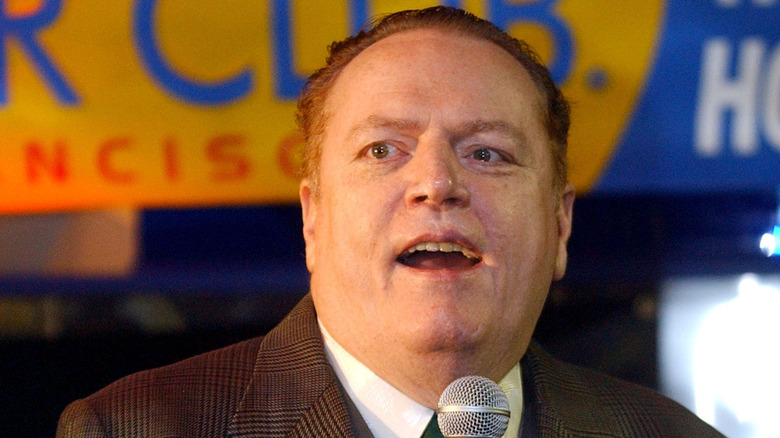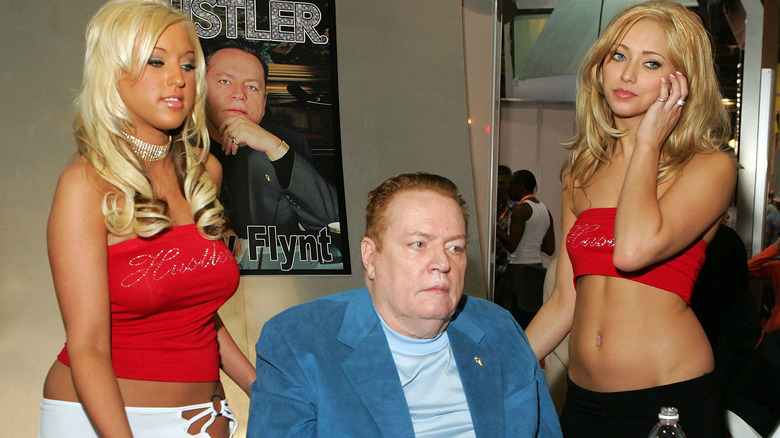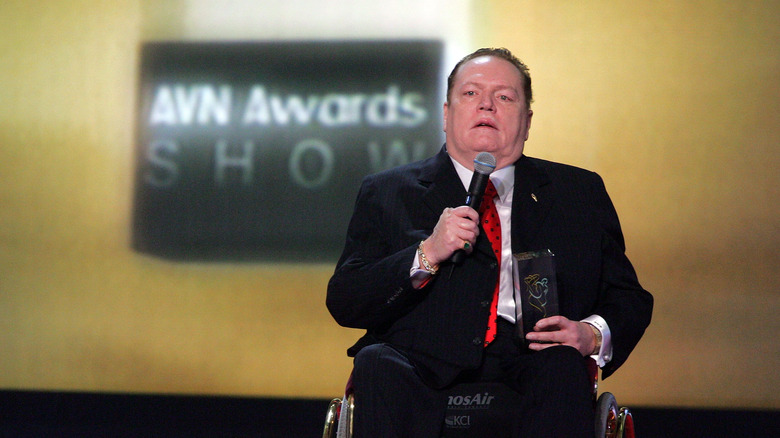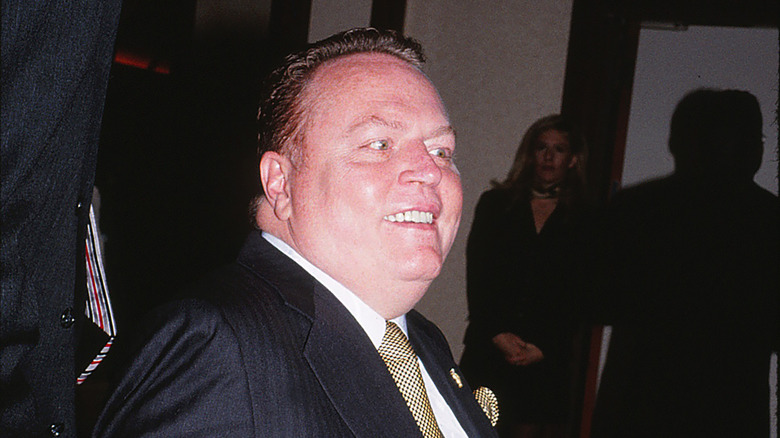Inside Larry Flynt's Criminal Past
Decades ago, the pornography industry was not like it is today. Porn consisted of images printed on paper with ink or films copied onto filmstrips (and later, VHS tapes). And for a while in the U.S., producing, distributing, and/or selling porn — even milder softcore stuff — could run you afoul of the authorities in certain jurisdictions. At the time, the First Amendment, which guarantees the right of free speech, wasn't much help, as various jurisdictions had carved out exceptions that didn't protect "obscenity."
More than once, porn producer Larry Flynt (pictured above) was called into a courtroom to account for crimes related to producing, distributing, and/or selling porn. Possessing a fiery temperament and a steadfast refusal to take any guff, he also racked up criminal charges for offending the wrong people. To Flynt, it was all just the price he paid for steadfastly advocating for the First Amendment and free speech, as The Free Speech Center explains.
Free Speech and 'Free Speech'
The First Amendment to the U.S. Constitution reads (via the National Archives), "Congress shall make no law ... abridging the freedom of speech, or of the press." That does not mean, however, that anybody can say, print, or post whatever they want, whenever they want, without legal or civil consequences. Over the centuries, the courts have held up certain exceptions to the rights of free speech in the U.S., as the Freedom Forum Institute notes. Exceptions include incitement to lawless actions, so-called "fighting words," perjury, and, as it relates to Larry Flynt, obscenity.
Here's the problem: The definition of "obscenity" largely depends on whom you ask, and the line between "obscene" and "not obscene" is going to be arbitrary and difficult to define. Or, as Supreme Court Justice Potter Stewart once said (per Yale Law School), "I know it when I see it." Of course, "I know it when I see it" doesn't work as a legal standard, particularly when a person's freedom is on the line. These days, the courts have largely washed their hands of it when it comes to attempting to define and regulate obscenity (save for things such as snuff films or child pornography), due at least in part to the ambiguous nature of it all. But in the 1970s ... not so much.
Flynt's First Obscenity Charge in Ohio, 1976
In the early 1970s, Larry Flynt was a successful businessman: a string of bikini bars in Ohio was the basis, at the time, for his empire (via The Free Speech Center). As the Los Angeles Times notes, Flynt advertised his strip clubs with two-page newsletters; they became so popular that they eventually got nationwide distribution and came to be known as Hustler magazine.
Hustler was quite a bit more explicit than other such magazines of the day, often publishing real photos and cartoons that, for the time anyway, pushed the envelope. According to Casetext, in July 1976, officials in Ohio had enough of Flynt and Hustler and rung him up on charges of "the exhibition or dissemination of materials known to be obscene." He was ultimately sentenced to 7 to 25 years in prison but only spent six days behind bars (via Bloomberg). As The New York Times reports, his conviction was later overturned on grounds of prosecutorial misconduct.
Another Obscenity Charge In Georgia, 1979
Larry Flynt's days of being criminally charged with obscenity didn't end in Ohio. A few years later, Georgia came calling. As The Washington Post reports, Fulton County's Solicitor at the time was a man named Hinson McCauliffe, and he was keen to rid Atlanta and all of Fulton County of pornography. Ten years earlier, he'd begun a campaign to shut down all of Atlanta's adult bookstores and to keep movies such as "Last Tango in Paris" and "Oh! Calcutta!" out of the city as well. He even tried and failed to have Hugh Hefner and Bob Guccione — publishers of Playboy and Penthouse, respectively — extradited to the Peach State to face criminal charges.
When it came to Hustler and its companion magazine, Chic, McCauliffe deemed that they violated Georgia's obscenity laws via their "shameful and morbid" content related to nudity, sex, or excretion (via The Washington Post). A jury agreed, and the judge sentenced Flynt to an 11-year suspended prison sentence, fined him $27,500, and ordered him not to sell his products in Georgia.
Contempt of Court and More Contempt of Court, 1983-1984
As mentioned previously, Larry Flynt had a fiery temper and, along with it, was not prepared to take any guff from anyone, even if they were a judge or prosecutor. Flynt was dragged into court multiple times to answer criminal charges and/or civil charges, and more than once his behavior landed him contempt of court citations.
For example, in 1983, as The New York Times reported, Flynt released videotapes that appeared to show FBI agents attempting to intimidate businessman John Z. DeLorean. A federal judge wanted to know how Flynt got that tape, and Flynt refused to answer, which got him a hefty fine. However, that was just the tip of the iceberg, as Flynt racked up contempt of court charges in other courtrooms as well over a period of several months between 1983-1984 (via the Los Angeles Times). At an arraignment for a charge of desecrating the U.S. flag, Flynt wore a diaper on his head, getting him another contempt of court citation. And as Salon reported, Flynt appeared before the U.S. Supreme Court and used the occasion to call the nine justices "nothing but eight a******* and a token c***!"
Ohio Again, 1998-1999
While the 1970s and 1980s were a busy time for Larry Flynt legally, by the 1990s, he was enjoying something resembling a period of peace and quiet; at least when it came to civil and criminal court cases. Nevertheless, in the waning years of the Clinton administration, Flynt's home state of Ohio once again came knocking on his door over obscenity charges.
As the Freedom Forum Institute reports, Cincinnati officials set up a sting operation that resulted in a 14-year-old boy being able to purchase pornographic VHS tapes from an adult bookstore Flynt and his brother owned. At the time, Flynt thought that changing societal attitudes since his first obscenity trial meant that a jury would see his side of things. "This time around, I expect to get a different jury, a less conservative jury. Community values have changed over the last 20 years," he said.
In fact, Flynt wound up taking a plea deal in 1999 that resulted in him agreeing to stop selling adult videos in Cincinnati and pay a $10,000 fine in exchange for the obscenity charges being dropped (per The New York Times).
